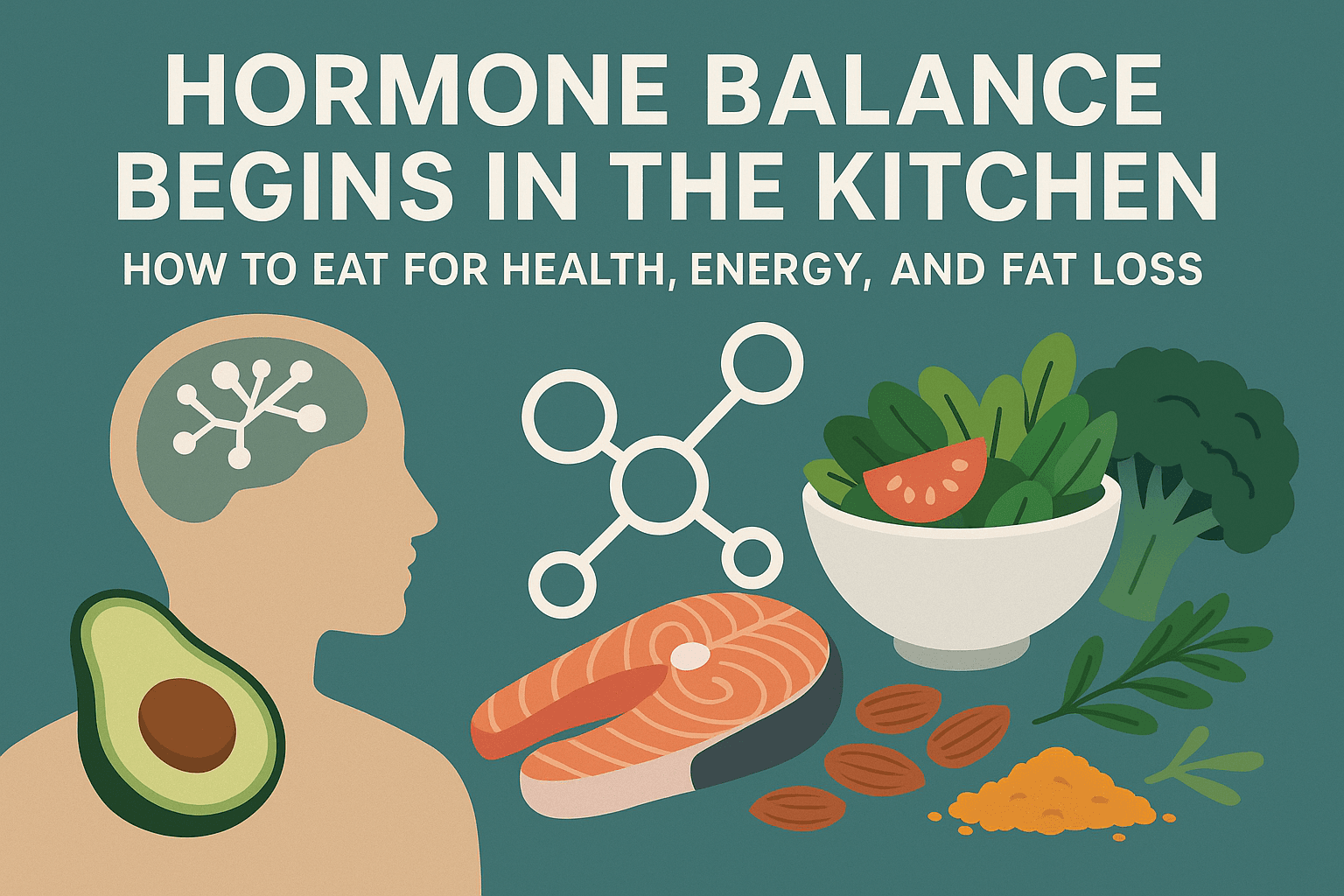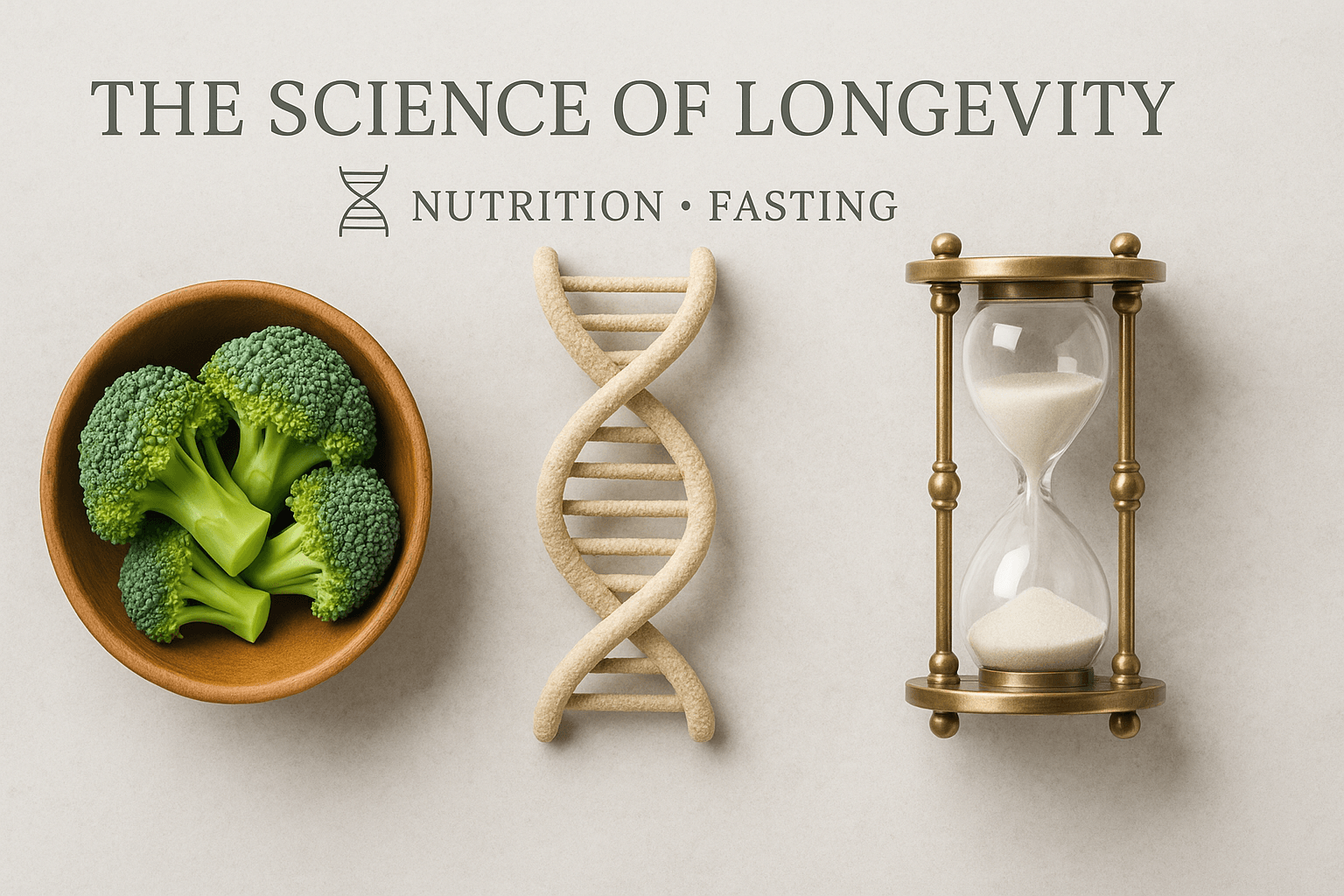Hormone Balance Begins in the Kitchen: How to Eat for Health, Energy, and Fat Loss
Published on May 22, 2025

Your hormones are your body’s messengers. They control everything — your appetite, your circadian rhythms, your stress level, your metabolism, your reproductive system, your emotional well-being.
When you are hormonally balanced, you feel like your best self, clear-headed, energetic, strong and emotionally stable. But when they’re out of sync? Fatigue, mood swings, cravings, weird periods, skin trouble, and stubborn weight are the order of the day.
The good news? Nutrition is one of the most significant tools you can use to support hormone balance — naturally and for the long term. Your body is always reacting to what you eat. Each meal either takes you closer to balanced or further from it in your internal chemistry.
This article will explore:
How food affects your hormone system
The key hormones involved in metabolism, stress, reproduction
What modern life gets wrong for hormonal health
The top foods and nutrients to restore balance
Daily menus and routines that support hormonal resilience
Understanding Hormones: The Chemical Conductors of Health
Hormones are signaling molecules produced by glands in your endocrine system. Think of them as the texts whizzing around your body — which regulate everything from hunger and sleep to energy, mood, sex drive, metabolism and fertility.
Major hormone groups include:
Insulin: blood sugar and fat storage
Cortisol: stress, energy, inflammation
Thyroid hormones (T3, T4): metabolism and temperature
Estrogen and progesterone: reproductive health and mood
Testosterone: muscle, drive, libido
Leptin and ghrelin: hunger and satiety
Common symptoms of hormonal imbalance:
Irregular or painful periods
Acne, thinning hair, oily skin
Low mood, irritability, anxiety
Sugar cravings, belly fat, fatigue
Cold extremities, constipation, brain fog
Top Disruptors of Hormone Balance:
Ultra-processed food with sugar, seed oils, additives
Chronic stress and cortisol overload
Poor sleep disrupting insulin, estrogen, testosterone
Frequent snacking and blood sugar instability
Plastic and chemical endocrine disruptors
Extreme dieting (low fat or low carb)
How Food Talks to Your Hormones
Food is more than fuel — it's molecular messaging.
Fats and protein trigger satiety hormones
Fiber improves insulin signaling
Micronutrients like zinc, selenium, magnesium support hormone production
Polyphenols and antioxidants reduce oxidative stress
The Ideal Hormone-Supportive Meal:
20–30g protein
Healthy fats (olive oil, nuts, avocado)
High-fiber, low-glycemic vegetables
Colorful, antioxidant-rich plants
Spices like turmeric, ginger, cinnamon
Avoid sharp blood sugar spikes — they disturb insulin, cortisol, estrogen and testosterone at once.
The Blood Sugar – Hormone Link
Too much insulin leads to
Fat storage, especially belly fat
Excess testosterone in women (e.g., PCOS)
Fertility issues and ovulation suppression
Fatigue, cravings, brain fog
To stabilize insulin and balance hormones:
Eat protein, fat, and fiber consistently
Avoid refined sugar and drinks
Walk after meals
Eat protein at breakfast
Nutrients for Hormone Repair and Resilience
Thyroid Support:
Selenium: brazil nuts, eggs
Iodine: seaweed, iodized salt
Zinc: pumpkin seeds, lentils
Avoid excess soy and raw crucifers if hypothyroid
Estrogen Detox:
Broccoli, kale, cabbage
Flaxseeds (lignans)
Fiber
B-complex and magnesium
Progesterone Support:
Vitamin B6: chickpeas, bananas
Healthy fats and cholesterol
Stress reduction: less cortisol = more progesterone
Testosterone Optimization:
Zinc and vitamin D
Resistance training
Monounsaturated fats
Sleep (7–9 hours)
Anti-Inflammatory Foods for Hormonal Healing
Leafy and cruciferous vegetables
Salmon, sardines, mackerel
Extra virgin olive oil
Turmeric, ginger, cinnamon
Berries, pomegranate
Chia, flax, hemp
Pasture-raised eggs and grass-fed meats
Limit:
Refined sugar, processed meats
Industrial seed oils
Artificial sweeteners
Excess alcohol and caffeine
Daily Hormone-Supportive Routine
Morning:
Sunlight exposure
Protein-rich breakfast (e.g., eggs + avocado + greens)
Gratitude or breathing exercise
Midday:
Post-lunch walk
Anti-inflammatory bowl with quinoa, veggies, olive oil, spices
Afternoon:
Snack: pumpkin seeds + apple
Herbal tea: raspberry leaf, chamomile, nettle
Evening:
Dinner: salmon, roasted sweet potatoes, sautéed spinach
Epsom salt bath, screen-free time
Lights off by 10–11 PM
Helpful Supplements (with supervision):
Magnesium glycinate (sleep, stress)
Omega-3 (mood, inflammation)
B-complex (estrogen metabolism)
Vitamin D (hormonal signaling)
Inositol (blood sugar, ovulation)
Adaptogens: ashwagandha, maca, holy basil
Conclusion: Balance Begins with Nourishment
Hormones don’t demand perfection. They want rhythm. They want nutrients. They want peace.
With balanced, colorful meals full of fat, protein, fiber, and micronutrients — your hormones get the message: “You’re safe. You’re supported.”
That’s where the healing begins.
One bite at a time.








